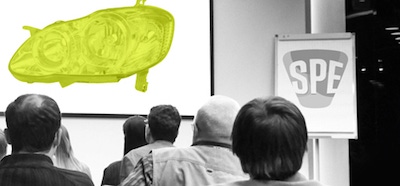Speaking truth to vinyl
September 26, 2016

 The Vinyl Plastics division of the Society of Plastics Engineers (SPE; Bethel, CT) organizes an annual conference that features technical talks, especially on PVC markets, new additives and regulations that affect users of PVC and its relatives. More than 150 people, mostly processors and additive suppliers, attended this year’s VinylTec conference, which ran Sept. 20 to 22 in Woodbridge, NJ.
The Vinyl Plastics division of the Society of Plastics Engineers (SPE; Bethel, CT) organizes an annual conference that features technical talks, especially on PVC markets, new additives and regulations that affect users of PVC and its relatives. More than 150 people, mostly processors and additive suppliers, attended this year’s VinylTec conference, which ran Sept. 20 to 22 in Woodbridge, NJ.
There was also a mini-show outside the meeting room, which included makers of compounding extrusion lines, testing machinery (torque rheometers) and suppliers of PVC additives such as stabilizers, plasticizers, flame retardants and lubricants. One exhibitor displayed a 3D printer in operation
I was the luncheon speaker on Wednesday, Sept. 21, and dealt with a topic I have addressed in PlasticsToday: The endless popular criticism of PVC (and other plastics) as toxic and/or enviro-negative. Since then, we've had the recall of millions of McDonald's Step-iT children's wrist fitness devices because their bands, presumably made of PVC, irritated some users' wrists. I told the audience to be proactive wherever they can, such as telling people they meet by accident that "plastics are NOT toxic, None Of Them!" I was also angry with those who imply danger from competitive plastics, as this feeds the already-strong plastophobia, as illustrated by a resin maker who advertised a replacement for "PVC, the poison plastic."
For those who are worried about chlorine, I reminded them that PVC is polyvinyl chloride, meaning the chlorine is tied up as it is in sodium chloride (common salt). And I compared the rest of the PVC molecule (as well as PE and PP)—all of which are long chains of carbon atoms with attached hydrogens—with normal (and "natural" nontoxic) body fat.
Finally, I tried to explain the popularity of the anti-plastics image as a combination of fear of the unknown (chemistry) and resentment and distrust of the large corporations that make the resins, as well as the secrecy of some small ones. We need to know more about the reasons why people are so down on plastics, so we can better cope with this attitude. Education is not enough.
In the meantime, if you are an SPE member and work with vinyl, consider joining the Vinyl Plastics division; if you’re not yet a member, join and make that your primary division. Then show up in San Antonio in fall 2017 for the next VinylTec event to network with the experts and hear the latest news.
Allan Griff is a veteran extrusion engineer, starting out in tech service for a major resin supplier, and working on his own now for many years, as a consultant, expert witness in law cases, and especially as an educator via webinars and seminars, both public and in-house. He wrote the first practical extrusion book back in the 1960s as well as the Plastics Extrusion Operating Manual, updated almost every year, and available in Spanish and French as well as English. Find out more on his website, www.griffex.com, or e-mail him at [email protected].
In the fall, Griff will present his one-day practical seminar, "Introduction to Extrusion," in Los Angeles on Nov. 15 and Houston on Dec. 5. Topics include the ten (11) key principles of extrusion, plastics chemistry for non-chemists, a review of extrusion hardware, the limits to production rate, quality control of raw materials, simplified rheology, start-up and shut-down procedures and troubleshooting common extrusion problems. E-mail him at the address listed above for more information.
About the Author(s)
You May Also Like




